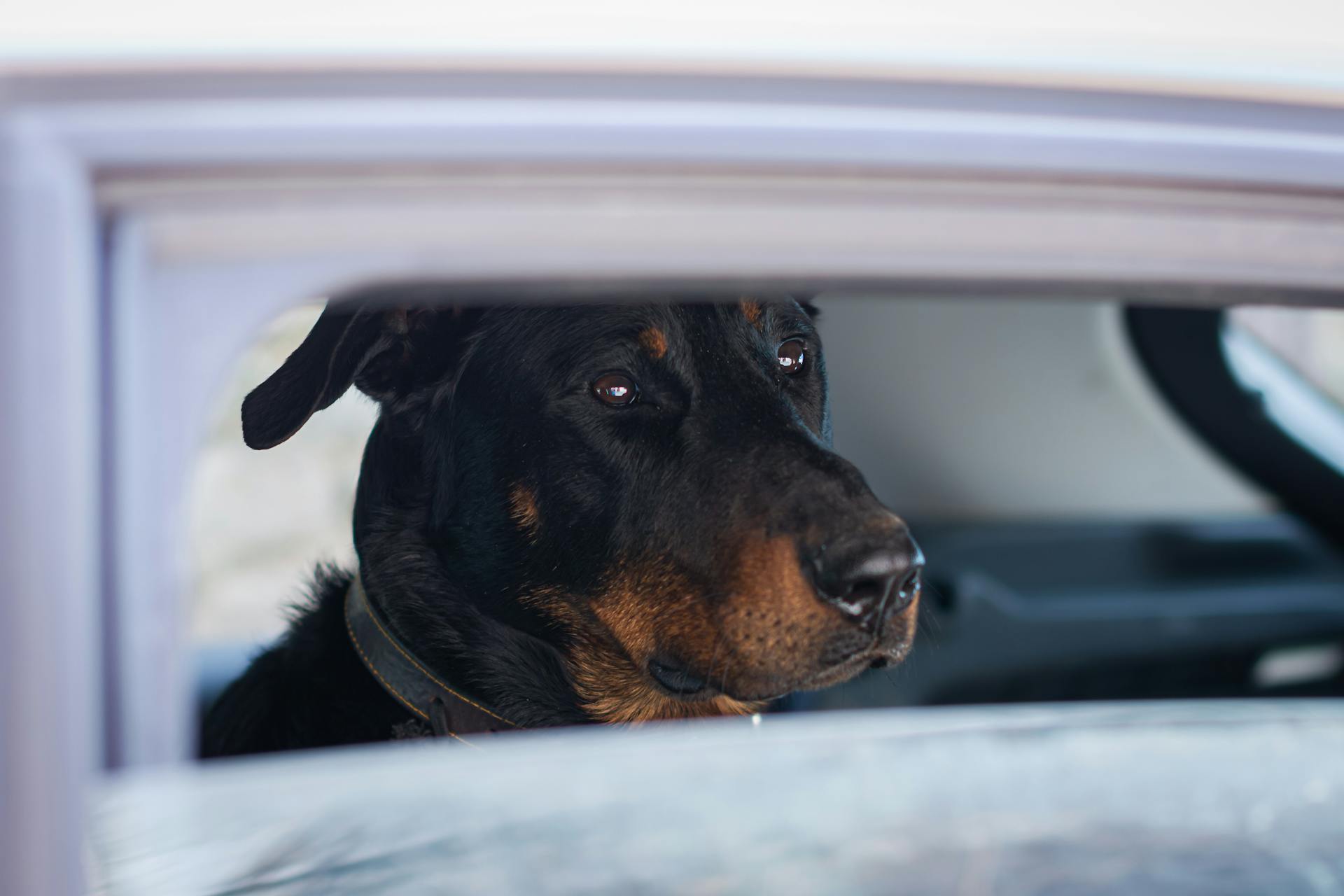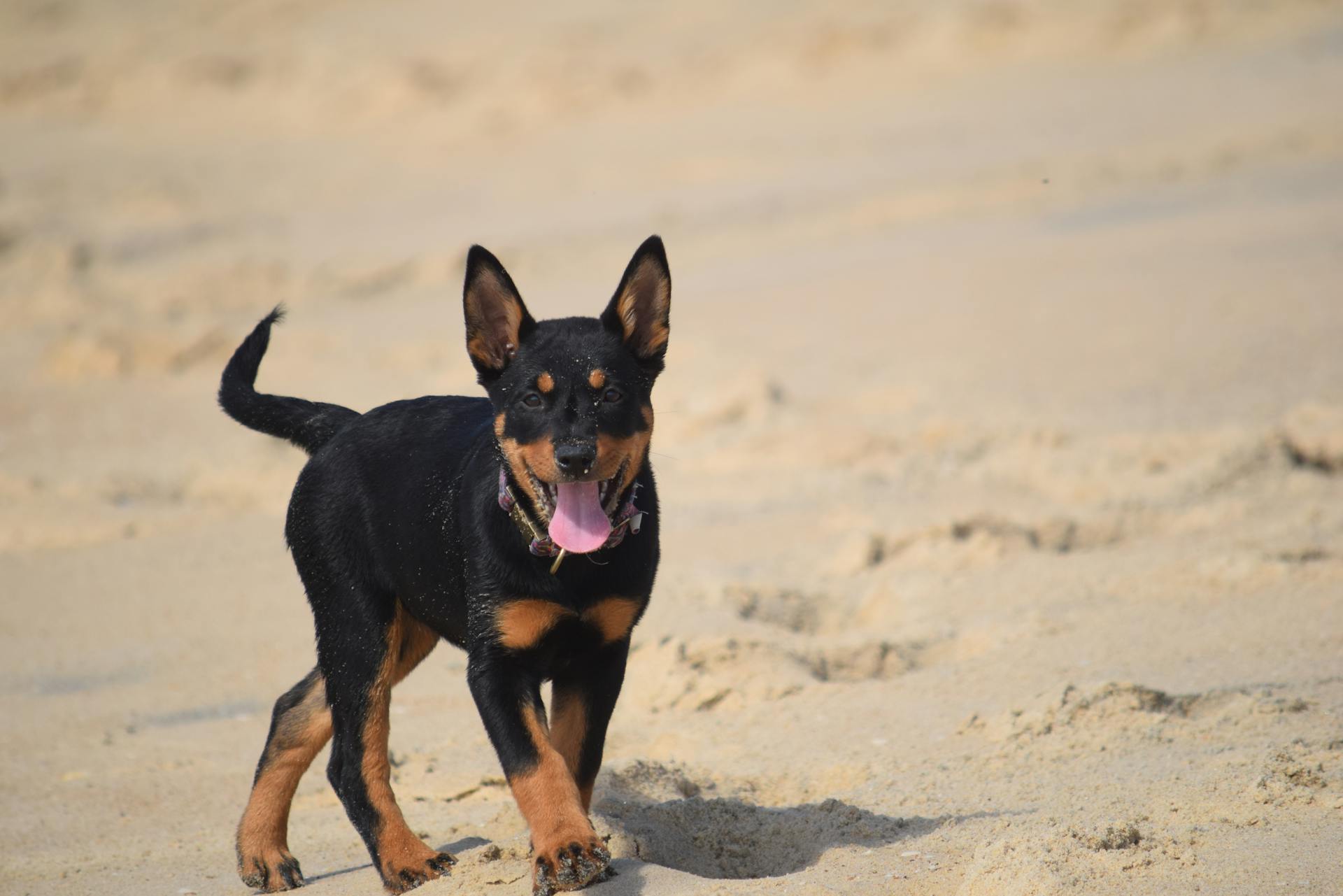
The Beauceron is a versatile dog breed that originated in France, bred to herd and guard livestock. They're known for their distinctive coat and impressive herding ability.
Beaucerons are medium to large-sized dogs, typically weighing between 70-110 pounds and standing between 23-27 inches tall. They have a short, dense coat that's either black or a combination of black and tan.
Their intelligence and trainability make them a popular choice for active families and farmers. Beaucerons are naturally protective of their family and territory, but they're not generally aggressive unless provoked.
They require regular exercise and mental stimulation to prevent boredom and destructive behavior.
Physical Characteristics
The Beauceron is a large and robust dog, known for its imposing presence. Males typically stand between 25 to 27.5 inches at the shoulder, while females are slightly smaller, ranging from 24 to 26.5 inches.
Their weight can vary between 70 to 110 pounds, with males being on the heavier side. The Beauceron's double coat is one of its defining features, consisting of a dense undercoat and a harsh, straight outer coat.
The breed comes in two recognized colors: black and tan or harlequin (blue and tan). The coat is short and requires regular brushing to maintain its appearance.
Here's a breakdown of the Beauceron's physical characteristics:
Their dark, expressive eyes are always alert, hinting at the dog's intelligence and quick mind. The Beauceron's ears rest high on the head, and the AKC breed standard allows for the ears to be cropped or natural.
Temperament and Personality
Beaucerons are highly intelligent dogs that thrive on human companionship and enjoy being an integral part of their family's life. They have a strong work ethic and are excellent companions for various tasks.
Their intelligence makes them easy to train, but it also means they can feel stressed or anxious if they don't get enough mental stimulation. They need daily walks, runs, or hikes, and ample chances to stretch their legs and use their instinctual abilities to smell, chase, and catch.
Beaucerons are not happy to stay inside all day or be confined to a kennel. They prefer to be with their humans and want to enjoy your day-to-day activities alongside you.
They are loyal and protective of their families, but can also be gentle and patient with children when properly socialized and trained. They have a natural sense of responsibility towards younger family members and will often take on the role of guardianship.
Early socialization and training are essential to ensure a well-rounded and balanced temperament. They can be strong-willed and need an experienced owner to lead the way, as they have the potential to dominate people who are unable to frame themselves as credible pack leaders.
Beaucerons are not aggressive, but they can be trained to be effective guard dogs when needed. They have a keen, watchful eye that can detect and follow quick movements, which can lead to intense games of chase with children or small pets.
They are highly energetic and need significant time and attention spent on physical and mental exercise. They require daily walks, runs, or hikes, and ample chances to stretch their legs and use their instinctual abilities to smell, chase, and catch.
Explore further: What Can You Feed Dogs Instead of Dog Food
Health
Beaucerons are generally healthy dogs, but like all breeds, they can be prone to certain health issues. Their average lifespan is 10-12 years, and they are considered a healthy breed.
Bloat is a life-threatening condition that Beaucerons may be susceptible to, especially due to their deep chest shape. Symptoms include salivating, trying to throw up without success, pacing, breathing rapidly, or acting distressed.
Hip dysplasia is another common issue in Beaucerons, which is a genetic condition where the hip joint doesn't develop properly, leading to arthritis and mobility issues. Regular exercise and weight management can help alleviate symptoms.
Beaucerons may also be prone to allergies, such as seasonal or food allergies, which can cause excessive itching. If you notice your pup is excessively itchy, consult with your vet about allergy testing or medications.
Dilated Cardiomyopathy (DCM) is a hereditary heart condition common among large breed dogs, including Beaucerons. Symptoms may include trouble breathing, cough, exercise intolerance, weakness, or fainting/collapse.
Recommended read: Beauceron Health Issues
Progressive Retinal Atrophy (PRA) is an inherited disorder that can lead to loss of vision in Beaucerons. A genetic screening test is available, and it's essential to ask your breeder about the test results.
To prevent bloat, it's recommended to use slow feeders and avoid exercising your Beauceron immediately after eating. A preventative version of surgery, called gastropexy, can also be performed to tack the stomach to the body wall and prevent bloat.
Here are some key health issues to be aware of in Beaucerons:
- Bloat: a life-threatening condition that can be prevented with slow feeders and avoiding exercise after eating
- Hip dysplasia: a genetic condition that can lead to arthritis and mobility issues
- Allergies: seasonal or food allergies that can cause excessive itching
- DCM: a hereditary heart condition that can lead to symptoms like trouble breathing and weakness
- PRA: an inherited disorder that can lead to loss of vision
Grooming
Grooming is an essential part of owning a Beauceron. Regular grooming will help keep your Beauceron's coat in good condition.
Beaucerons have a short, dense double coat that requires regular grooming. They need to be brushed weekly with a slicker brush or a grooming glove to remove loose hair and keep the coat shiny.
During shedding seasons, more frequent brushing may be necessary to manage the increased hair loss. Beaucerons typically shed heavily in the spring and autumn.
Recommended read: Dog Grooming for Anxious Dogs
Baths are seldom necessary, unless the dog has found something unpleasant to roll in. When your Beauceron does need a bath, use a good quality dog shampoo with natural ingredients and make sure they are rinsed thoroughly and dried well.
It's essential to brush your Beauceron's teeth daily to prevent tartar buildup and maintain good oral health. Starting to brush your dog's teeth as a puppy will make the process easier for both you and your dog.
Beaucerons need their nails trimmed every six to eight weeks. Some Beaucerons may naturally file down their nails through play and exercise, but this is not always the case.
Here's a quick guide to grooming your Beauceron:
- Brush your Beauceron weekly with a slicker brush or a grooming glove
- Bathe your Beauceron every few months or as needed
- Trim your Beauceron's nails every six to eight weeks
- Brush your Beauceron's teeth daily
- Check your Beauceron's ears regularly for signs of infection or wax buildup
Training and Behavior
Beaucerons are highly intelligent dogs that thrive on mental and physical stimulation. They excel in obedience competitions, search and rescue operations, and other demanding tasks.
Their trainability and willingness to learn make them a favorite choice for many dog owners. Consistent, positive, and firm training methods are essential to bring out the best in a Beauceron.
Early socialization is crucial to ensure they develop into well-rounded and confident dogs. They respond well to reward-based training techniques, as they are eager to please their owners. Beaucerons have high energy levels and need regular physical exercise to maintain their overall well-being.
They have a strong work ethic and excel in various working roles, including herding, guarding, search and rescue, and police and military work.
Behavioural Characteristics
Beaucerons are naturally wary of strangers, making early socialization with people outside the family crucial.
Their intelligence and loyalty make them highly trainable, but they can be strong-willed and need an experienced owner to lead the way.
To manage their protective attitude, intensive socialization is a must, starting from a young age and continuing throughout their life.
Beaucerons are eager to please and respond well to praise from a strong pack leader, making positive reinforcement training a great approach.
They can be prone to depression if faced with violence or corporal punishment during training, so patience and kindness are essential.
Check this out: Dog Names for Strong Dogs
As a breed, they mature gradually after three years of age, and before that, short exercises of ten minutes are recommended.
Beaucerons are naturally dominant and need to be introduced to other pets and family members carefully to ensure a harmonious household.
Their intelligence and trainability make them excel in obedience, agility, and flyball competitions, but only for those who are willing to commit the time and effort.
In the hands of their owners, Beaucerons are generally calm, but they can be wary of strangers and may adopt a protective attitude if they feel their family is threatened.
With proper training and socialization, Beaucerons can make excellent family pets and loyal companions.
For another approach, see: Are Boxer Dogs Good Family Dogs
Training
Beaucerons are highly intelligent dogs that respond well to encouragement and positive reinforcement training. They're eager to please and will be motivated by their favorite toy, not treats.
Beaucerons have high prey drives, so training that hones in on their desire to herd, like using flirt poles or Treibball, is a great way to keep them engaged.
For your interest: All about Dogs Dog Training
A good rule is to start training and socializing your Beauceron as a puppy, taking them to puppy classes and then graduating to obedience training. This will help them learn commands like sit, stay, and come, and how to walk nicely on a leash.
Early socialization is crucial to ensure your Beauceron develops into a well-rounded and confident dog. They respond well to reward-based training techniques and are eager to please their owners.
Beaucerons require regular physical exercise to maintain their overall well-being, with high energy levels that need outlets to release their pent-up energy. Long walks, jogs, and play sessions in a securely fenced area are recommended.
Consistent, positive, and firm training methods are essential to bring out the best in a Beauceron. They have a strong work ethic and excel in various areas of training, making them versatile working dogs.
Beaucerons are highly trainable, intelligent dogs that both want and need constant stimulation. They're eager to please and extremely responsive to praise from a strong pack leader.
Training should begin at a very young age, and good manners, such as sitting when waiting for food, and not jumping up without invitation, should be taught from when the pup is 8-weeks-old.
Related reading: What Nutrients Do Dogs Need in Homemade Dog Food
Because of their natural wariness of strangers, Beaucerons must be intensively socialized with people outside the family, starting as soon as a puppy is acquired, and continuing throughout life.
Their trainability and willingness to learn make them a favorite choice for obedience competitions, search and rescue operations, and other demanding tasks.
Diet and Nutrition
Beaucerons tend to do well on high-quality, commercial dog food that provides a balanced diet meeting all their nutrition needs.
You'll want to provide food designed for their current stage in life, whether they're a puppy, an adult dog, or a senior dog. Your veterinarian can help you nail down a feeding chart that will guide you on how much and how often to feed your dog based on their specific needs.
Beaucerons love mental challenges, so they might enjoy slow feeders and interactive toys like Kongs that dispense their food through play.
Protein materials such as meat, fish, chicken, and eggs are very important for Beauceron dogs.
It's better to use high-quality and balanced foods and adjust the number of ingredients according to their physiological needs.
Consult with your veterinarian to choose the best nutrition for your dog.
Additional reading: Is High Protein Dog Food Good for Dogs
Exercise and Environment
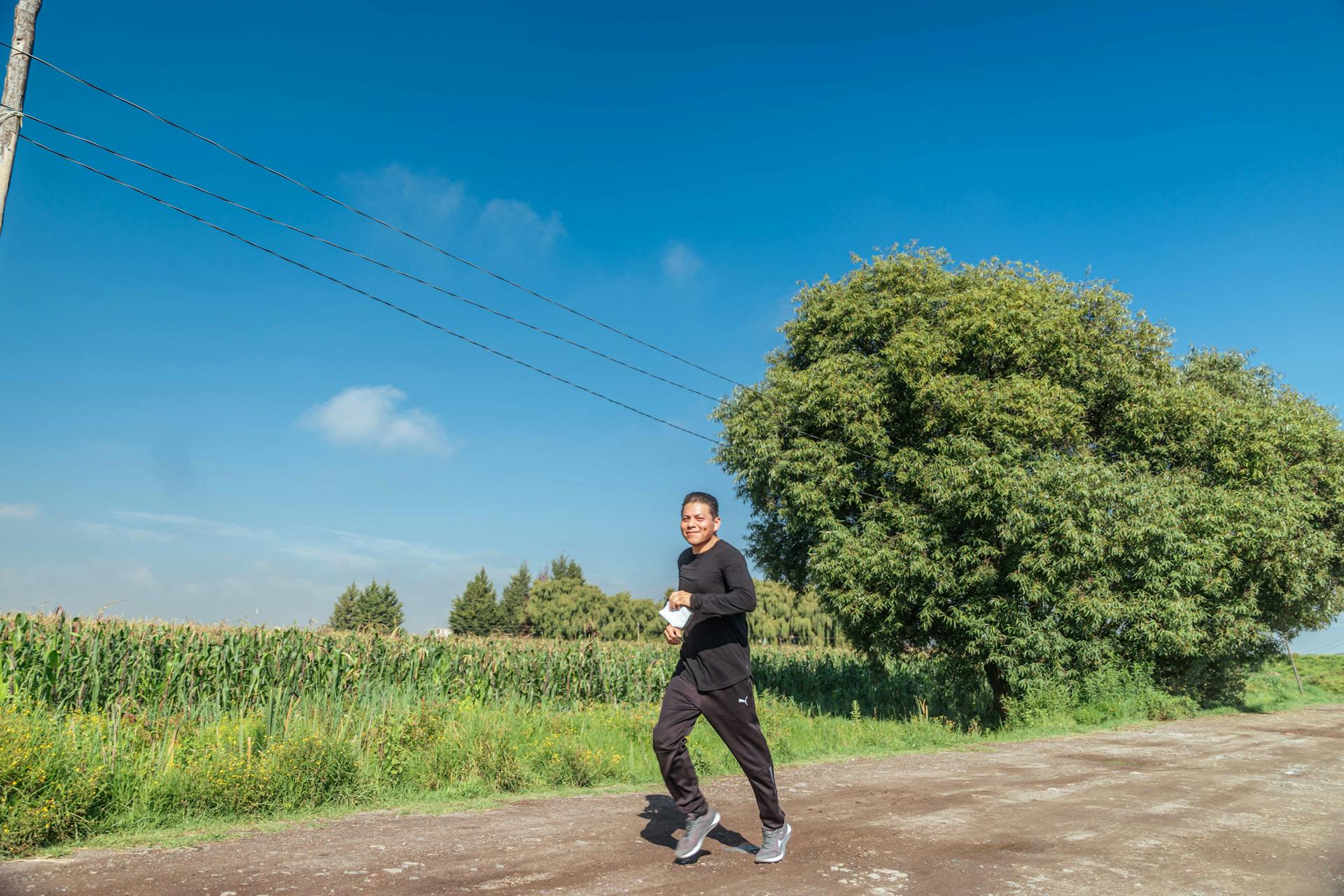
Beaucerons are high-energy dogs that need regular exercise to stay happy and healthy. They require at least two hours of exercise per day, including both mental and physical stimulation.
A long walk of about an hour is a great way to start, allowing your Beauceron to explore and sniff out new sights and smells. You can also try jogging, hiking, or playing fetch with them.
Beaucerons love to run and play outdoors, so activities like Treibball, parkour, and flyball sports are perfect for them. They'll also enjoy Canicross, a fun form of urban mushing where they get to pull you along.
If you live in a smaller apartment, don't worry - Beaucerons can adapt as long as they get at least two long, brisk walks every day. This will help them burn off excess energy and prevent destructive behavior.
A larger home with a yard is ideal, but it's not necessary. Beaucerons can thrive in smaller spaces as long as they get regular exercise and mental stimulation.
Here's an interesting read: Dog Food for High Energy Dogs
History and Origin
The Beauceron dog has a rich history that dates back to France in the Middle Ages. Its origin can be traced back to a Renaissance manuscript from 1578 by French naturalist M.Buffon.
The Beauceron is also known as Berger de Beauce or Bas Rouge, and it was one of two French sheepdogs that were officially classified in 1896. It was named the Beauceron and the Briard, with the Beauceron having shorter hair.
The Beauceron has had many roles throughout its history, including being used in World War I in trench warfare, as messenger dogs for the French army, and to herd and guard livestock. It's also been used as a police dog.
This breed was officially recognized by the American Kennel Club in 2007 and assigned to the Herding group.
History of
The Beauceron's origin dates back to France in the Middle Ages, with the oldest manuscript referencing the breed dating back to 1578. The breed was developed to be a multipurpose dog, with a strong connection to herding and guarding livestock.
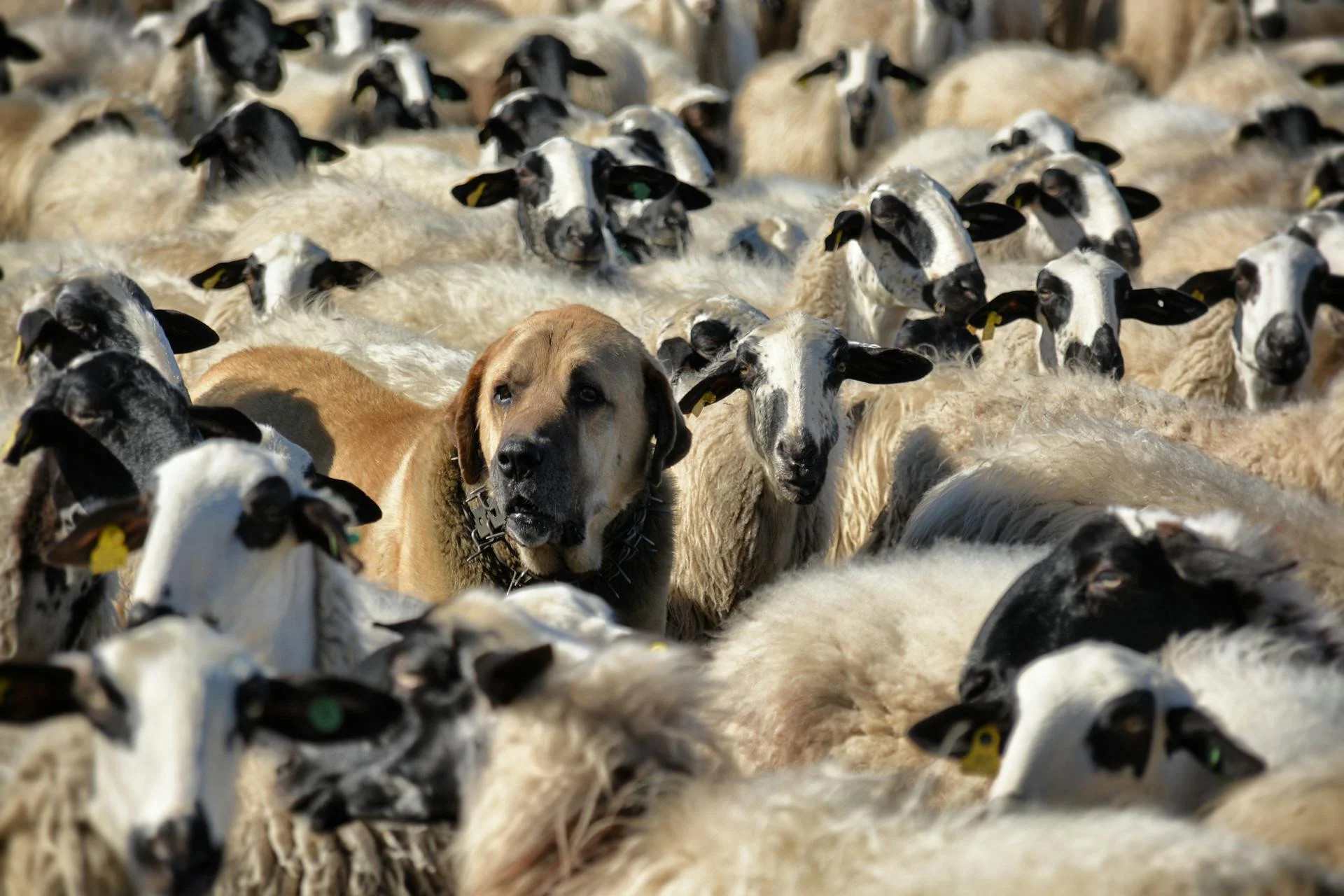
In the 19th century, the Beauceron became popular for driving cattle and sheep across the plains of La Beauce. They were also used as police dogs and in World War I as messenger dogs for the French army.
The Beauceron was officially recognized by the Societe Central Canine in 1893 as the Berger de Beauce, and eventually in 1922 the breed club, Club des Amis Du Beauceron, was founded. This recognition helped to standardize the breed and establish its characteristics.
The Beauceron's intelligence and strong drive to work made it a valuable asset in various roles, from herding and guarding to police and protection duties. They were also used as mine-detecting dogs in World War I and World War II.
The Beauceron was finally recognized by the American Kennel Club in 2007, and it remains one of the AKC's rarest breeds. Today, Beaucerons are used as military dogs, police dogs, and search and rescue dogs.
Breeding
A Beauceron dog's pregnancy is a fascinating process, and it's essential to understand the variables that affect the number of puppies born. Typically, a female Beauceron can give birth to between 3 and 6 babies per pregnancy.
The number of puppies born depends on the female dog's age, health status, and genetics. A Beauceron dog's pregnancy period is about 63 days, or two months.
The duration of pregnancy, like the number of puppies, depends on the condition of the female dog during pregnancy. If a female Beauceron is healthy and well-cared for, she's more likely to have a smooth and successful pregnancy.
Famous
The Beauceron has made a name for itself on stage and screen, thanks to its trainability. It's been featured in several movies and TV shows.
You might have seen a Beauceron named Henry in the movie Hotel for Dogs. He was a main character in the film.
The breed was first introduced to a wider audience in 1979 through the James Bond film Moonraker. It starred a Beauceron in a significant role.
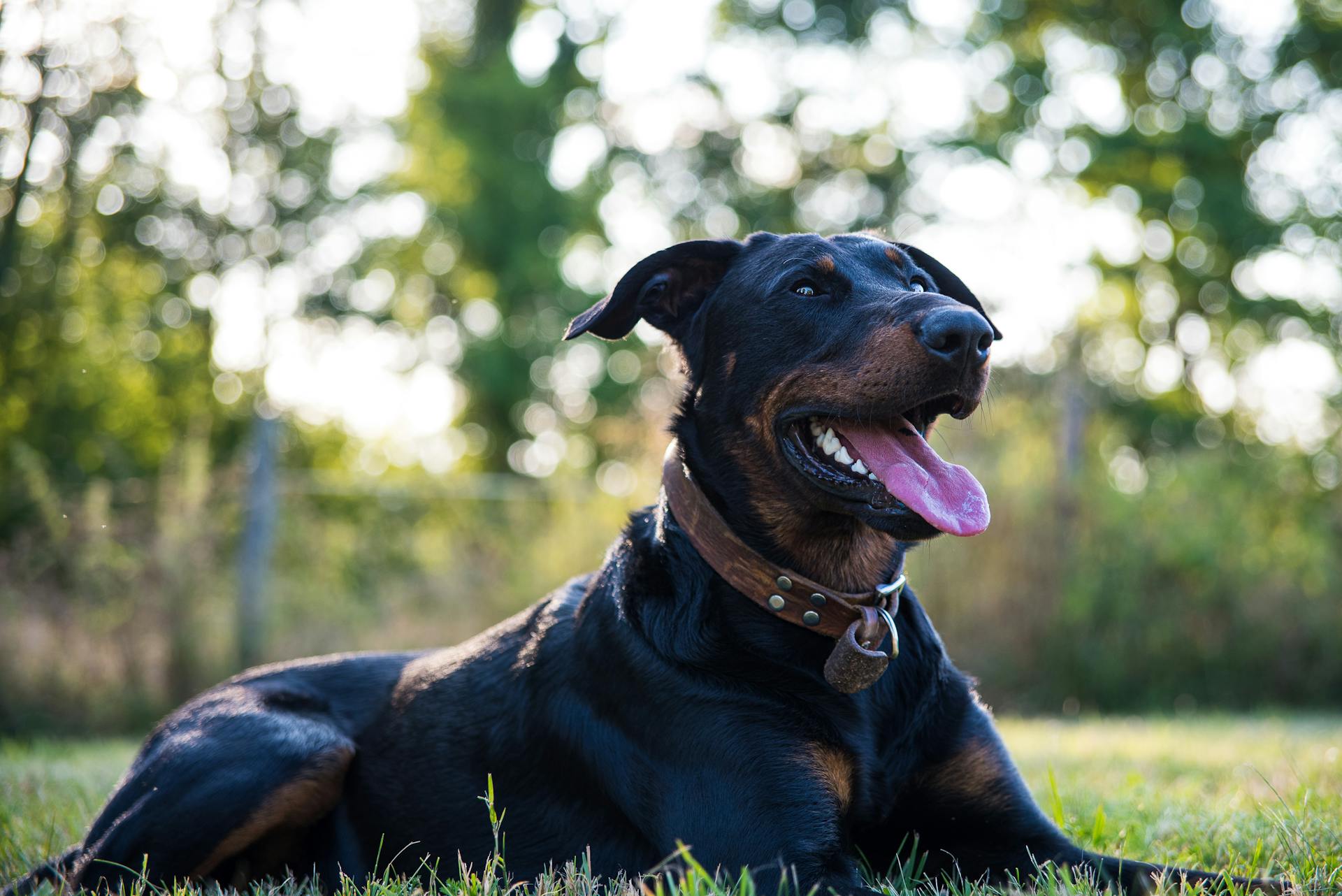
Another notable film featuring a Beauceron is the 1970 French film The Wild Child, or L'Enfant sauvage. A Beauceron is among the pack of hunting dogs used to track down the feral child in the lead role.
In the 2010 film Marmaduke, the main antagonist Bosco is a Beauceron. He's a significant character in the movie.
Cross-Breeds
Cross-Breeds are a fascinating topic when it comes to the Beauceron breed. Beauceron-cross hybrids are not easy to come by, but they do exist.
One of the most common Beauceron-cross hybrids is the Beaucador, which is a cross between a Beauceron and a Labrador Retriever. This mix creates a unique combination of characteristics.
Another popular Beauceron-cross hybrid is the Beauceroodle, which is a cross between a Beauceron and a Poodle. This mix often results in a low-shedding coat.
Here's a list of some of the most common Beauceron-cross hybrids:
- Beaucador – Cross between a Beauceron and a Labrador Retriever
- Beauceroodle – Cross between a Beauceron and a Poodle
Frequently Asked Questions
What dog breeds make up a Beauceron?
The Beauceron is a French shepherd breed that shares ancestry with the Briard, and its original name may also be linked to the Doberman Pinscher. Its unique heritage is a result of its origins in Brie, not Beauce, as its name might suggest.
How much does a Beauceron puppy cost?
A Beauceron puppy typically costs between $1,500 and $2,500, depending on factors like breeder reputation and bloodline quality. Prices may vary, so it's best to research and contact reputable breeders for more information.
How big can a Beauceron get?
A Beauceron typically stands between 61-70 cm (24-27.5 inches) tall and weighs between 30-45 kg (66-100 pounds).
Is Beauceron a rare breed?
No, Beaucerons are not considered a rare breed. They may not be as well-known as some other breeds, but they are still relatively common.
What is the difference between a Doberman and a Beauceron?
The main difference between a Doberman and a Beauceron is their original purpose: the Beauceron is a herding dog, while the Doberman is a people-oriented breed. This distinction affects their behavior, temperament, and work style.
Featured Images: pexels.com
